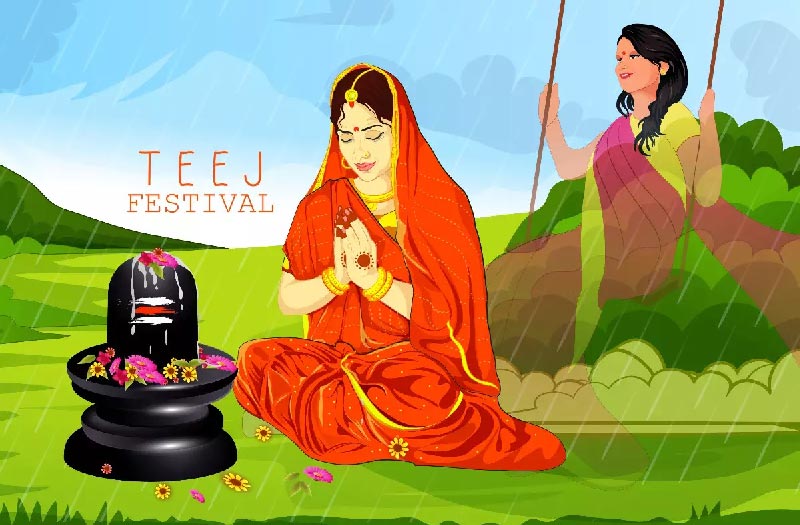
Haritalika Teej: Nepal's Festival of Love, Devotion, and Unity
Haritalika Teej is a revered festival celebrated predominantly by Nepali Hindu women. This festival is a beautiful fusion of spirituality, tradition, and cultural richness. Celebrated on the third day of Bhadrashukla, Haritalika Teej honors Lord Shiva and Goddess Parvati, embodying the essence of marital bliss and longevity.
Celebrated annually on the third day of the bright half of the lunar month of Bhadrapada, the festival is a grand tapestry of devotion, love, and sisterhood.
Historical Backdrop: When Mythology Meets Spirituality
The Tale of Goddess Parvati and Lord Shiva
Traced back to the ancient Hindu scripture, Shiva Purana, the essence of Haritalika Teej lies in Goddess Parvati's unwavering devotion to Lord Shiva. As the legend goes, Goddess Parvati, also known as Adi Shakti, had to navigate familial and societal challenges to be with her divine consort. Despite being arranged to marry Lord Vishnu, Parvati’s focus remained on Lord Shiva, to whom she devoted a series of fasts and prayers. Her spiritual endeavors culminated in the breaking of her fast by Lord Shiva himself, eventually leading to their celestial marriage.
For those interested in delving deeper into the mythology and spiritual aspects, reading the following texts can be highly enlightening:
- Shiva Purana
- Skanda Purana
- Naradiya Purana
Fasting Rituals: A Multi-Faceted Spiritual Discipline
Types of Fasting: A Spectrum of Choices
In accordance with one’s physical capabilities and personal circumstances, different types of fasting methods are observed during Teej:
- Nirjala Fast: Complete abstinence from food and water.
- Phalahar: Consumption of fruits, nuts, and water.
- Ek Bhukta: Eating just one complete meal during the day.
Health Advisory: Safety First
Prior to embarking on a fast, especially the Nirjala type, women are advised to consult their physicians. Particular attention should be paid by pregnant and nursing women, who should opt for a modified fast, guided by healthcare professionals.
Dar: The Ritualistic Pre-Fast Meal
Nutritional Insights
Dar is consumed the day before the fasting to prepare the body and soul for the ritualistic journey. It comprises sattvic foods, considered pure and beneficial in Ayurveda, which include grains like rice, protein-rich lentils, and an array of fruits and vegetables.
Sumptuous Dar Recipe Ideas for a Spiritual Kickstart
- Lentil Soup with Himalayan Herbs
- Vegetable Pulao enriched with Ghee
- Yogurt and Mixed Fruit Salad with a drizzle of honey
Societal and Cultural Layers: Unveiling the Tapestry of Womanhood
Women’s Gathering: A Sanctuary of Emotional Resilience
Teej is also a golden opportunity for women to strengthen their social bonds. Homes and temples become bustling hubs where women gather to sing, dance, and most importantly, share their life stories, offering each other emotional support and guidance.
Interfaith and Cross-Cultural Celebrations
Over the years, the allure of Teej has crossed religious and ethnic boundaries, with non-Hindu women actively participating and finding resonance in its empowering themes.
Pilgrimage Points: The Soul-Stirring Temples
Pashupatinath Temple, Kathmandu
This revered temple is the epicenter of Teej celebrations, attracting devotees not just from Nepal but from around the globe.
Regional Shiva Temples
Various Shivalayas or Shiva temples across Nepal also experience a surge in devotional activities, including hymn singing and traditional dances.
Frequently Asked Questions: Addressing Common Queries
Is Teej Exclusively for Women?
While primarily aimed at women, Teej is gradually opening up to include men, particularly when the women of the household are unable to fast.
Are There Any Social Critiques of Teej?
Dr. Devmani Bhattarai, a notable theologian, argues against the criticism that Teej perpetuates gender stereotypes or is discriminatory. He emphasizes that the fast is a well-rounded spiritual exercise meant for the collective well-being of the family.
Conclusion:
Haritalika Teej transcends its ritualistic framework to manifest as a festival celebrating the complexities and wonders of life, love, and spiritual yearning. As it continues to break cultural and social barriers, it embraces a universal message that is more relevant now than ever.
May your Teej be blessed with boundless love, lasting happiness, and unparalleled spiritual fulfillment.
Festival




